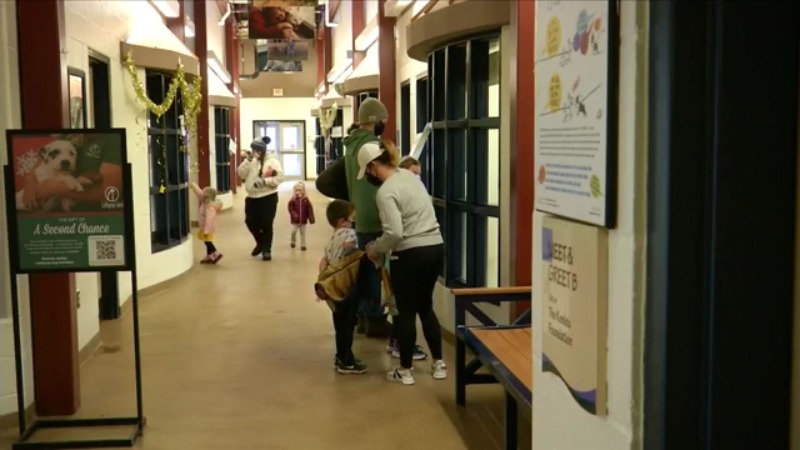Animal companions help fight loneliness at St. John’s independent living
[anvplayer video=”5181360″ station=”998131″]
ROCHESTER, N.Y. — Sue LeSage has been at St. John’s independent living for ten years. For four of those, she’s had Princess the dachshund by her side.
“When I was a kid, I fell in love with a doxen that looked just like this, and I carried that love with me forever,” LeSage said.
Princess came into her and her husband’s life at eight weeks old, from Syracuse.
“My husband was ill, and very selfishly, I knew I was going to lose him either to a different kind of placement, or to death” she said. “I desperately wanted something to keep me sane.”
Shortly after the two got Princess, LeSage’s husband Connie passed away. She said that having a dog around helped her cope with the grief. And research shows that she’s not the only one. According to Dr. Yeates Conwell at the University of Rochester Medical Center, animal companions provide great mental and physical benefits.

Lollypop Farm
“When an individual is feeling lonely that is associated with a range of potentially very serious health outcomes,” he said. “Owning a pet, having it in your home, was associated with reduced levels of loneliness and therefore, by extension a whole other range of physical outcomes.”
Dr. Conwell is a psychology professor who conducts research on how loneliness affects people, primarily senior citizens. He’s also studied the positive effects that a pet can have on senior citizens. Whether a trained therapy dog, or just a pup from a shelter, a furry friend can boost your mood.
“Even robotic pets can evoke some of these same feelings of self worth and happiness and relatedness and connectedness,” he said.
When LeSage lost her husband, Princess was there for her.
“[Princess made a] huge difference. She gives me great comfort, and joy, and everything,” she said. “She has brought me friends, and I’ve brought her friends.”
Dr. Conwell says that LeSage isn’t the only one to get through grief with a pet.
” Grieving is a complicated process,” he said, “The pain doesn’t go away, but it becomes part of the persons life and their fabric and they can be comfortable with.”
Of course, Dr. Conwell doesn’t think a pet could replace a loved one, he says there is evidence to suggest it helps you physically as well as mentally.
“When there is a gap through the loss of a loved one it can be replaced […] in a different way, but no less important — by having another being there to care about to love and to take care of,” he said.
At St. John’s independent living, the pets help more than just their owners. Staff said that the dogs always bring smiles to the faces of other residents when the animals are out and about.
“Old age, may in some ways, interestingly, prepare people to benefit more from having certain kinds of pets,” Dr. Conwell said. “It’s a relationship-building phenomenon.”